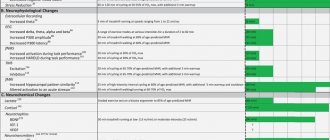Medical information is reliable Checked by Eremin Alexey Valentinovich
A mental disorder in which a person is haunted by obsessive thoughts and actions is called obsessive-compulsive disorder or obsessional neurosis. This phenomenon significantly reduces the quality of life and therefore treatment of obsessive-compulsive disorder in Moscow should begin as early as possible. For this, Dr. Isaev’s clinic has all the capabilities - experienced specialists, the best branded drugs, equipped comfortable wards and rooms for outpatient visits.
Obsessions and compulsions
Obsessions are obsessive thoughts, fantasies, fears, and images. The person understands the abnormality of his condition, but cannot switch to anything else. At this time, pressing problems and tasks fade into the background, and the process of normal life becomes impossible. Against the background of these phenomena, the patient experiences pronounced fear and anxiety. Most often, obsessions occur in the form of:
- aggressive impulses;
- erotic fantasies;
- memories of unpleasant episodes in life;
- phobias of irrational content.
The second part of the manifestation of the disease is compulsions, or obsessive ritual movements that are repeated many times. The patient feels the need to commit them, and when trying to resist, a feeling of strong tension and fear appears. A certain action gives him temporary relief, relieves the severity of anxiety, forcing repetition. The most commonly observed compulsions are:
- washing hands and body before wounds and irritation appear;
- constant house cleaning;
- putting things in the closet;
- constant checking of the iron, stove, door lock;
- counting objects (pillars, trees, steps);
- walking around or jumping over cracks in the asphalt;
- repetition of a certain set of words.
The main feature of obsessions is that they are devoid of rationalism. And compulsions are the inability to refuse them.
The patient himself is in an adequate state at this time and understands the strangeness of his sensations and behavior, and most often realizes the need for treatment of obsessive-compulsive disorder. And this fact further strengthens his position and multiplies the problem. He begins to be afraid of going crazy and worries about the safety of his loved ones. But, as practice shows, neurosis of this type does not lead to severe mental disorders, and even the most seditious and aggressive thoughts never turn into active actions. And this distinguishes a person with neurosis from a mentally abnormal patient in a state of passion or a patient with hallucinations.
The approximate number of people suffering from obsessional neurosis is 3% of the entire world population. But experts consider this figure to be underestimated, since many patients carefully hide their problem from others and do not want to go to the doctor. The manifestation of the disease is registered in the age category from 10 to 30 years in residents of cities with low incomes. Among the patients, there is a slight predominance of men over women. Usually, at least 5-7 years pass from the onset of the disease, after which a visit to a specialist for help follows.
If we describe the character of a patient with obsessive-compulsive disorder, it can be noted that he is different:
- high intelligence;
- adequate thinking;
- a heightened sense of responsibility;
- conscientiousness and anxiety;
- diligence and pedantry in performing work;
- suspiciousness and the desire to be the best in everything.
A person suffers from this disorder for a long time and goes to the doctor only when the pathology progresses, when the neurosis becomes noticeable to others and begins to significantly reduce the quality of life.
Fears and anxieties do not always accompany obsessive neurosis. They occur at different frequencies in all people. Phobias in a normal person usually act as a defensive reaction of the body. The well-known worry about an iron or gas stove not being turned off, followed by a check, cannot be considered a pathology. But if even after one or two or more tests a person continues to have a desire to repeat the test and constant fear even after it, then we can talk about the presence of a disorder.
Causes of obsessive compulsive disorder
Before treating obsessive compulsive disorder, it is necessary to understand its etiology. The exact cause of the disease has not yet been established, but a number of factors have been identified that can provoke it. And their complex effects are often observed. It can be:
- psychotraumatic situations;
- constant stress;
- conflicts with loved ones and within the individual;
- severe fatigue, asthenia;
- belief in the power of rituals that save you from problems;
- excessive pedantry;
- low self-esteem;
- inability to adequately respond to life's difficulties;
- hereditary features of brain functioning;
- disruption of the autonomic nervous system;
- low levels of hormones (serotonin, norepinephrine, dopamine);
- disruption of the nervous system (muscle tension, stiffness);
- condition after an infection.
Recently, psychiatry experts have expressed an opinion about the great influence of characteristics of upbringing and other experiences in the formation of obsessive-compulsive disorder. It could be:
- tough and picky teaching style;
- the influence of a person important to the child with signs of obsessive-compulsive neurosis;
- rigor and moralism, religious education.
In order to identify the true cause of the disorder and receive full assistance, you should simply call Dr. Isaev’s clinic. You can do this for free, make an appointment with a doctor and get a full consultation.
Wrong internal beliefs also play a huge role in the manifestation of the disease, including:
- the belief that if you think about something often, it will definitely happen;
- prohibiting oneself from certain types of thoughts and fantasies;
- equating thoughts with actions according to the degree of responsibility;
- accepting blame for everything that happens around you and trying to change it.
Cluttered daily to-do list
Photo: Pixabay
Lack of time management skills, overestimation of your capabilities, inflated demands on yourself - and so many things have accumulated that it is physically impossible to complete them. As a result, we push ourselves to the point of exhaustion and simply cannot help but worry.
Time is forged, it passes much faster than you have time to do everything you have planned.
Perhaps plans for the day are quite acceptable, but some people tend to constantly put off even urgent and important things. There are no ideal people; many cannot manage their time wisely. As a result: a person begins to rush, worry, worry and get upset.
In this case, you can simply stop worrying needlessly. It is enough to remove all non-essential things from your list for the day. You need to train yourself to control your time.
As soon as everything that is planned and planned is accomplished, you will discover: “the deadlines are no longer pressing.” You will no longer worry about not having time to do anything.
Symptoms of obsessions and compulsions
Treatment of obsessive-compulsive disorder in Moscow at Dr. Isaev’s clinic is carried out successfully, since an individual approach is taken to each patient and only modern techniques are used. Therapy begins with identifying symptoms of deviation. The main signs of a violation are:
- presence of obsessions (obsessive thoughts);
- anxiety, tension and fear associated with them;
- compulsions (the same actions that allow you to get some relief).
All these manifestations form a single cycle, which repeats from time to time. Some patients have a predominance of obsessions, others have a predominance of compulsions, and there are also patients with the same severity of obsessive thoughts and actions.
Since the manifestations of the disease are not always typical, diagnosis requires consultation with an experienced psychiatrist and psychotherapist. To make an appointment, you can call or leave a request on the clinic’s website.
Mental symptoms
The disease is a mental disorder and is accompanied by characteristic symptoms. The patient's obsessive thoughts may include the following:
- fear of getting infected, getting dirty;
- unreasonable concern for the life and health of loved ones;
- fear of discovering that you are gay;
- sexual images and fantasies;
- constant desire for order and symmetry;
- excessive superstition, passion for ritual and cult phenomena.
With obsessive compulsive disorder, the thoughts and images that constantly come to him are perceived by the patient himself as his own. This disease differs from split personality, when the patient hears “voices” from the outside or from his “other self.” With neurosis, a person tries to control thoughts and movements, but he fails to do this. The more he resists, the more anxiety and desire to perform the ritual grows.
The most common compulsive movements associated with this disease are:
- plucking or pulling out body hair;
- constant washing of hands and body;
- nail biting;
- wiping door handles and other objects;
- checking the stove, iron, door lock;
- arranging things in strict order;
- accumulation of unnecessary trash;
- frequent utterance of prayers, mantras and other phrases.
Doing these actions itself does not bring much pleasure, but it can reduce the level of tension, fear and anxiety. But this only lasts for a while, and then obsessions arise again and the phobia grows, and the cycle repeats. Compulsions may outwardly look like normal work, this applies to putting things away or cleaning the house. In some cases, they have no rational basis, for example, jumping over asphalt cracks. But for the onset of calm, a person performs them without fail, but at the same time is fully aware of their uselessness and absurdity.
Physical signs
Treatment of obsessive-compulsive disorder in Moscow at Dr. Isaev’s clinic includes providing assistance to relieve mental symptoms and eliminate physical signs of pathology. Patients with obsessional neurosis often experience dysfunction of the autonomic nervous system. And this leads to the following deviations:
- insomnia;
- dizziness;
- heartache;
- headache;
- frequent blinking;
- seizures and tics;
- pressure surges (hypo- and hypertensive crises);
- loss of appetite;
- dyspepsia;
- increased sweating and chills;
- tachycardia;
- dyspnea;
- dry mouth;
- decreased libido, impotence.
All these disorders are complications of the underlying pathology. And with proper complex therapy they go away on their own. In some cases, additional treatment is required to speed up the restoration of autonomic functions.
The method of providing assistance also depends on the type of neurosis. It happens:
- chronic (from 2 months or more);
- recurrent (with periods of exacerbation and “bright” intervals);
- progressive (continuous manifestation with gradual deterioration).
When the disease becomes chronic, and the reason for this is often the lack of professional therapy, the type of obsessive states expands. If at the beginning of the disease a person could check that the stove or iron was turned off 2-3 times a day, then later this action begins to be repeated 5-6 times. With a progressive form of pathology, performing rituals can take the patient most of the day and there is no time left for other types of activity.
Dr. Google, tell me
Did your neighbor cough on the minibus? This is definitely coronavirus, I’ll get sick tomorrow - this is what the anxious patient thinks and rushes home to google the symptoms.
To search for medical information on the Internet, they even came up with a special word - “cyberchondria”. This is a variant of hypochondria - anxiety about health, which is fueled by scary stories about illnesses on forums or dubious sites.
I read a little about headaches - and now you’re sitting at the computer crying that you have brain cancer. And no one will come to the funeral!
According to Yandex, health is one of the most popular search topics: more than 7.5 million searches every day, more than 5 thousand times per minute. A third of them are about symptoms and diseases. However, if you tend to worry about your health, this is the first thing you should give up.
This type of anxiety is not new. The hero of Jerome K. Jerome's story "Three Men in a Boat and a Dog," written long before the advent of the Internet, came to the library to "inquire about a trifling illness" and eventually discovered that he had had cholera for two months, and after Anemia will worsen for two weeks. He went through the entire medical reference book and found symptoms of absolutely all diseases, except for puerperal fever.
“I entered this reading room as a happy, healthy person. I crawled out of there a pathetic wreck.”
About the same thing happens to us when we turn to the all-powerful Dr. Yandex or the brilliant Dr. Google. We come with doubts, but leave with the conviction that we have cancer of everything.
It also happens: a relative of a distant friend was diagnosed with stomach cancer - and now you have a stomach ache.
The star died of brain cancer - and you remember that recently you had headaches too often.
A Chinese man coughed in a minibus - you no longer travel on this transport. Yuri Dud made a film about HIV - and if you have had at least one unprotected contact, you decide that you definitely have the infection. You are not alone in this: after the release of the film, the demand for rapid tests to determine the disease has sharply increased.
On the one hand, this is great: getting checked is useful. But if you want to do this every week, panic that the nearest pharmacy doesn't have a test, and before going to bed you remember to Google how long you have to live before developing AIDS, then we have bad news for you. You failed another rapid test - for hypochondriacal disorder.
Diagnostics
To make a diagnosis, doctors are usually guided by typical symptoms that act as criteria for obsessive-compulsive disorder:
- frequently repeated thoughts and actions;
- the patient’s assessment of thoughts and images as their own;
- attempts at unsuccessful resistance;
- negative attitude towards these phenomena in the patient;
- the appearance of signs of distress against the background of obsessions and compulsions.
In order to refine the diagnosis, special tests are used, during the assessment of which a psychiatrist or psychotherapist determines for himself the following basic aspects of pathology:
- the nature of thoughts and actions;
- frequency of their occurrence;
- the extent to which they interfere with the patient's daily life;
- the amount of time they take;
- the strength of a person’s desire to suppress the manifestations of the disease.
This test allows you to determine the presence and severity of obsessional neurosis. It is also used during treatment of the problem, repeating once a week to evaluate the effectiveness of the prescribed therapy.
It is mandatory to differentiate with other mental illnesses, which may be accompanied by similar symptoms, but require a slightly different approach to providing assistance. Obsessions occur in some types of depression and early schizophrenia.
When delirious, a person does not have a tendency to resist his thoughts and wishes, he shows solidarity with them, and in this case, treatment for schizophrenia is required. Obsessive neurosis is accompanied by the patient’s rejection of his obsessive obsessions and the presence of a critical attitude towards this problem.
In some cases, obsessive-compulsive disorder has concomitant neurotic abnormalities. Therefore, along with obsessive states, it may be necessary to treat depression, relieve excessive anxiety, and get rid of attention deficit disorder.
Remember relaxation techniques
It is not for nothing that physical activity is considered the best way to relieve stress. And indeed, just run, jump, throw a couple of hundred kilograms of iron or beat a punching bag - and the strongest tension already recedes. But here’s a paradox: for some reason a person does not feel relaxed and peaceful. And it’s all about lactic acid, which remains in the muscles after heavy loads and creates a feeling of tightness and rigidity. There is only one way out - to combine “blowing off steam” with relaxation techniques. For example, yoga or breathing exercises. According to American doctors, yoga not only improves mood, but even helps fight aging - by suppressing inflammatory reactions in the body. If yoga or tai chi aren't your thing, there are more traditional relaxation techniques. But, of course, not alcohol.
Treatment of obsessive-compulsive disorder in Moscow
Treatment of obsessive-compulsive disorder in Moscow at Dr. Isaev’s clinic is carried out after a survey, examination and consultation of the patient with a number of specialists - a neurologist, psychiatrist, medical psychologist and psychotherapist. Each admitted patient receives an individual approach after identifying the prevailing symptoms and the cause of the disease. The latest methods of influence allow you to get rid of obsessive neurosis in a short time.
Psychotherapy
The most effective ways to influence the patient are the following methods of psychotherapy:
- cognitive-behavioural;
- hypnosuggestive;
- group;
- psychoanalysis;
- psychoeducation.
Cognitive therapy helps, after several sessions, to change your attitude towards the thoughts that constantly come to mind and not react to them with obligatory rituals. First, the patient and the specialist list in the form of a list all his fears and other signs of an obsessive state. After which the patient is brought face to face with the object of his phobia, initially for a short time. After a frightening situation is realized and nothing terrible happens, the brain is convinced of safety. This leads to a gradual decrease in the number of obsessive thoughts and the disappearance of the need for action to reduce their intensity.
The method is suitable for patients who have willpower and basic self-discipline. After several weeks of such exercises, it is possible to cope with the pathological condition forever.
Treatment of obsessive convulsive disorder is also effectively carried out using suggestion with simultaneous immersion in a hypnotic trance. This helps to delve into the depths of the problem and establish new patterns of behavior and thoughts. Such exposure helps quickly, as it allows you to consolidate the correct skills and conclusions immediately at the level of consciousness and subconsciousness. Suitable for suggestible patients, it gives positive results after just a few sessions.
Classes are usually held in a group format, which serve to provide the patient with the information he needs and to train him to manage stressful situations. Such psychological assistance allows people with the same problems to support each other and share their experience of improving their condition and reducing fears. While visiting several people, you can improve the quality of cognitive behavioral therapy by simulating various problem situations with a request to play them out and make the most rational decision under the given conditions. A positive result becomes noticeable after two or three months with regular visits.
Psychoanalysis helps the patient when his rational thinking is well expressed. Using this technique, it is possible to detect hidden causes in deep childhood that led to psychotrauma and obsessive neurosis. For this purpose, a person tells the specialist all his thoughts that constantly come to him, even if they are shameful or obscene. As a result of this, they together find signs of repressing a dramatic situation into the subconscious, return it to the conscious area and explain the reason. When constructing a cause-and-effect relationship, the signs of the disease gradually weaken and disappear.
Psychoeducation of the patient and people close to him helps to develop a reasonable attitude towards the disease. And this knowledge allows you to manage your condition. The fact is that relatives are often involved in the rituals of a person suffering from this disorder and their help should consist of refusing to participate.
Depending on the severity of the disorder and the presence of concomitant mental pathologies, the attending physician recommends treatment on an outpatient basis with regular visits to specialists or hospital stay. The latter option is more acceptable if it is necessary to correct the patient’s condition with the help of potent medications. 24-hour monitoring helps to select the minimum dose of the drug to achieve the desired result.
Use of medications
The use of medications for obsessive-compulsive neurosis is an auxiliary method. It is required when psychotherapy has an incomplete effect or there is a need for additional treatment for anxiety or heart pain, as well as other somatic and mental disorders. The following groups of tools are used for this:
- sedatives;
- antidepressants;
- antipsychotics;
- mood stabilizers;
- tranquilizers;
- anticonvulsants.
All medications are prescribed only by a psychiatrist; independent treatment with their help can lead to unpredictable consequences. And after stopping the drugs, the disease will appear again, since its causes will not be eliminated. Quite often, with such a deviation, it is necessary to treat depression, since obsessive thoughts are perceived negatively by the patient himself and can cause a strong decrease in mood levels.
All the products that are given to patients at Dr. Isaev’s clinic are proven branded drugs from the manufacturer. All of them undergo multiple studies before they are used for their intended purpose.
In addition to psychotherapy and medications, your doctor may prescribe supportive treatment for OCD. To speed up recovery and consolidate the positive results already obtained, herbal medicine is used using natural plant components with a calming and tonic effect. B vitamins will help improve the functioning of the nervous system, and nootropics can eliminate dizziness and normalize the supply of nutrients to the brain.
Questions and answers
Can obsessive compulsive neurosis go away on its own?
Mild forms of obsessive-compulsive neurosis can go away on their own. This usually happens after a bright and memorable event, when thoughts are crowded out and replaced by interesting work, a change of place of residence, or the birth of a child. In some cases, the disorder gets better with age. But over a period of time, the disease greatly reduces the quality of life and distracts from completing tasks.
When and which doctor should I contact?
You should consult a doctor if you experience disturbing and obsessive thoughts that have no rational basis. At the same time, no amount of willpower or desire to be distracted helps eliminate their influence. To solve the problem, you need to contact an experienced psychotherapist or psychiatrist.











